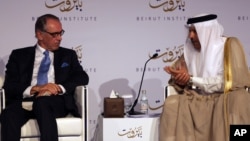U.N. Deputy Secretary-General Jan Eliasson said he is hopeful U.N.-mediated peace talks on Yemen can begin within a few weeks, possibly by the end of the month. Eliasson has just returned from a tour of several key countries in the Middle East, where he held crisis talks on the conflicts in Yemen and Syria.
Eliasson said it has been a struggle to get Yemen peace talks underway. He said he is encouraged, though, by the interest he found from both Saudi Arabia and United Arab Emirates on one side, and Iran on the other to start negotiations as soon as possible.
He expresses disappointment that talks, which were supposed to have begun last month, never materialized. They fell apart when Yemen’s government in exile pulled out demanding that Houthi rebels first accept a U.N. Security Council resolution that calls on them to recognize the government of exiled President Abd-Rabbu Mansour Hadi.
Eliasson said the newly proposed talks have a better chance of getting off the ground because the Houthis have sent a letter to the U.S. Secretary-General confirming they would adhere to the resolution, essentially meeting Hadi’s terms.
Eliasson told VOA he hopes both sides will come to the talks without pre-conditions and that they will adhere to a cease-fire during the political process ahead. He said immediate action must be taken to end the enormous human suffering in Yemen. He warned of the dangers of terrorism gaining a greater foothold the longer this war and others in the region continue.
“We certainly have seen the effects of the bombings and the military activities on the ground, which has destroyed even civilian targets and has had an enormously dangerous humanitarian effect," he said.
"I also want to repeat my point that al-Qaida has increased their influence and territorial control because of this war. So, that is the irony that you have these extremists groups gaining from both the war in Syria and the war … in Yemen continuing," said Eliasson.
The United Nations estimates more than 2,300 civilians have been killed in Yemen since the Saudi-led coalition began its bombing campaign against Houthi rebels on March 26.
While in the Middle East, Eliasson said he held lengthy discussions about Russia’s increased military involvement in Syria. He said Saudi Arabia and UAE expressed some concerns and said they hoped this military action was being solely directed against terrorism, particularly against the so-called Islamic State.
He said it is absolutely critical to resume negotiations to end Syria’s five-year long civil war. He said the United States, Russia, Saudi Arabia, Iran, and Turkey, among other countries, are key to moving forward this political process.




